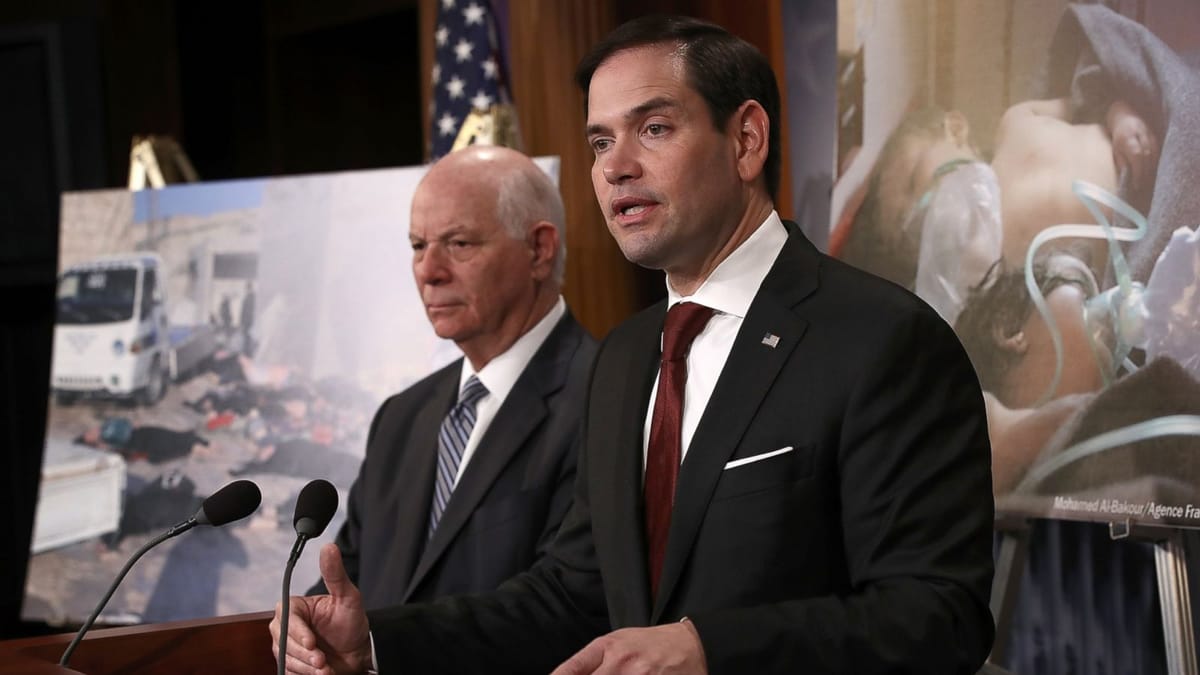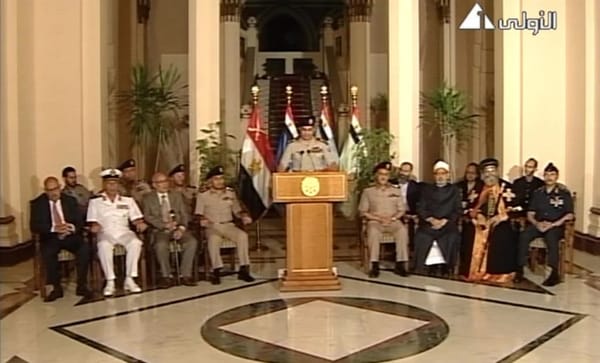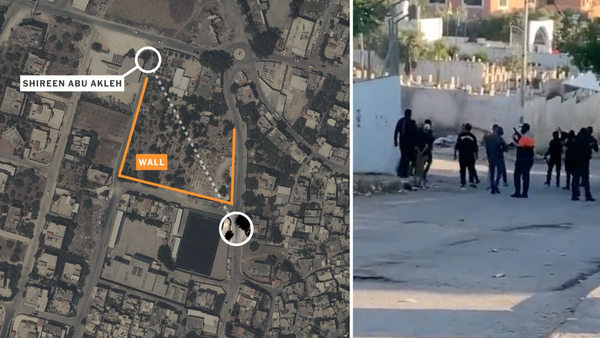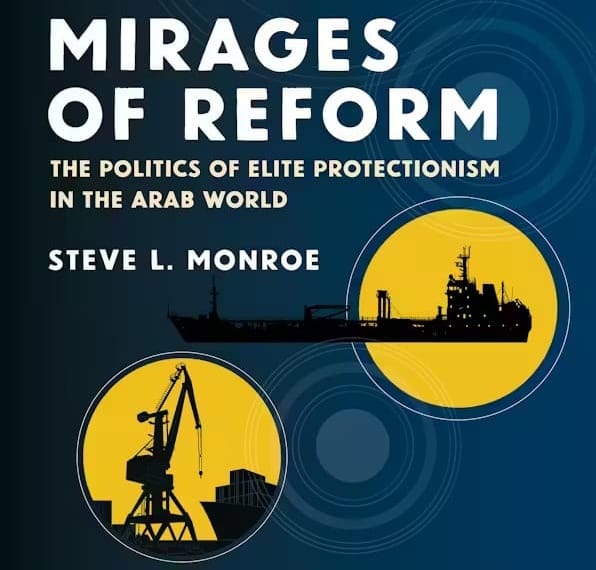The Ghost of Marco Rubio's Caring About War Crimes

Welcome to The Ghost of Abu Aardvark! I decided to leave Substack because of its well-documented Nazi problem and its consistent promotion of highly objectionable authors and ideas. If you subscribed to the Substack blog, hopefully the transition to Ghost will be smooth and easy; please let me know if you encounter any problems as we work out the glitches. The transition is expensive, so if you've been considering a paid subscription this would be a great time...
Marco Rubio used to say that he cared about war crimes. A lot. As a Senator and vocal member of the Senate Foreign Relations Committee, Marco Rubio co-sponsored a series of versions of the Syrian War Crimes Accountability Act. The effort began in 2014 in the wake of the Asad regime's horrifying 2013 chemical weapons attack, after President Barack Obama (correctly) opted to step back from bombing Syria in favor of an internationally-supervised agreement to remove the regime's chemical weapons. The Act proposed "establishing a Syria-specific standard of reporting and accountability for crimes against humanity. The bill would require the U.S. State Department to report to relevant congressional committees on war crimes and crimes against humanity committed in Syria."
In 2017, Rubio again co-sponsored the Act. "This bill is a first step towards ensuring accountability for the human rights violations inflicted against innocent civilians in Syria,” said the Senator who cared very deeply about war crimes. During an emotional April 2017 presentation of images of dead Syrian children, Rubio waxed eloquent: "Imagine if you are that father and that is your child who has just been gassed to death by Bashar al-Assad's regime in #Syria....We also can’t ignore the countries that made this possible. This would never have been possible had Assad not had cover from Russia's Vladimir Putin. There needs to be a level of outrage. This needs to become a priority. Otherwise, we have lost our compass as a people and as a nation."
Human Rights Watch approved of the bipartisan initiative in hopes that it would "reinvigorate US support for justice in Syria after years of unchecked atrocities." A version of the Act finally passed in 2019 and came into effect in 2020 as the Caesar Syria Civilian Protection Act following the revelations of a vast archive of photos documenting torture and abuse in Asad's prisons. In September 2023, just months before Hayat Tahrir Al-Sham overthrew the Asad regime, Rubio co-sponsored a bill to extend the Caesar Sanctions to 2032 because he cared so deeply about the Syrian people and the need for America to stand against war crimes.
It is sad and ironic that Marco Rubio, who cared so deeply about war crimes against the Syrian people, is now proposing to eliminate the State Department Office of Global Criminal Justice which handles war crimes. His reorganization of foreign assistance has crippled the Syria war crimes investigations he once championed and slashed the funding of Syrian White Helmets first responders. It's of a piece with his abandonment of every belief about foreign policy he once claimed, and ran for president on, in favor of serving the Trump administration's campaign to destroy American state capacity, cripple its global presence, and eviscerate its rule of law. Rubio's betrayal on war crimes, once his own signature issue, is a relatively small thing in the broader scheme of things. But to me, at least, it resonates.
Rubio does have a chance to make up for these betrayals, though so far he has not taken the opportunity: it is obviously time for those sanctions to be lifted, key members of Congress and almost all international humanitarian organizations are asking for them to be lifted, and the State Department itself says that is exploring ways to lift them. It should. Those sanctions applied specifically to the abuses of the Asad regime, which no longer exists, and were ostensibly meant to protect the Syrian people, who are now suffering from them.
The Trump administration seems to prefer to keep the sanctions in place because it views the new Syrian government, in line with Israeli views, as simply a jihadist insurgency regardless of its efforts to establish order and govern legitimately in post-Asad Syria. The sanctions actively work to prevent Syrians from consolidating such a post-Asad future, keeping the country weak and isolated, imposing economic hardship on its long-suffering people, and interfering with government efforts to establish its authority and sovereignty (including over the areas currently illegally occupied, presumably forever, by Israel).
The EU, UK and Canada lifted some of their Syria sanctions a few months ago, and the UK finally lifted more of its key Syria sanctions the other day, but the US has not. Last month, the US reportedly sent the new Syrian government a list of conditions for sanctions relief, which is at least a start. The current Senate Foreign Relations Committee recently sent a bipartisan letter to the Secretary of State, Marco Rubio, urging short term sanctions relief in critical sectors to open the space for engagement with the new government. Rubio, who used to care very deeply about protecting Syrian civilians, has not to this point taken up that invitation. He has at least publicly limited himself to condemnations of "radical Islamist terrorists" (a view popular in Israel and, reportedly, held by the White House's fake terrorism expert).
Earlier this month, there were reports that the administration was considering Syria sanctions relief. State Department official Paul Guaglianone responded to an admirable initiative by Senator Elizabeth Warren and Rep Joe Wilson to advocate for sanctions relief by stating that “the end of Bashar al-Assad’s brutal and repressive rule presents a historic opportunity for Syria and its people to rebuild, potentially free of Iranian and Russian influence,” and signaled openness to exploring forms of sanctions relief and waivers. They should do exactly that. Rubio should live up to his long-stated commitment to protecting Syrian civilians and support sanctions relief, rein in Israeli occupation of Syrian territory (something only the United States can do), become a constructive actor in rebuilding a stable Syria, and not actively ruin Syria's much-deserved "Day After."



